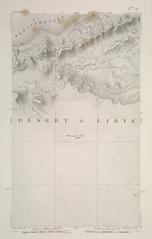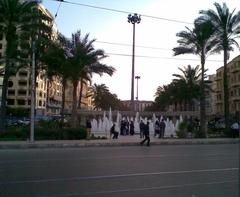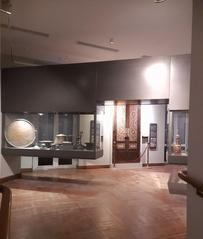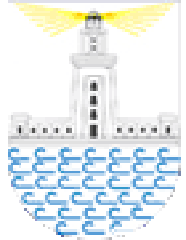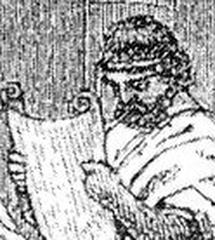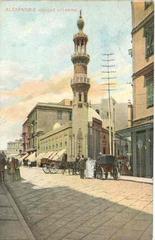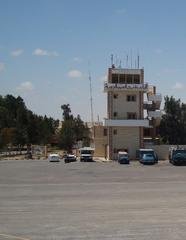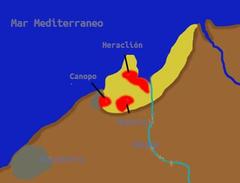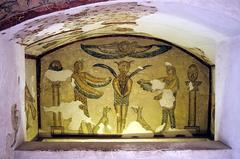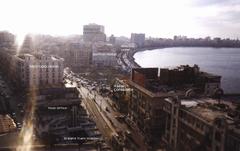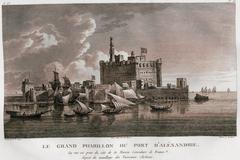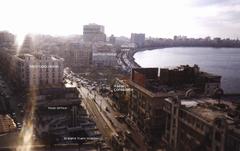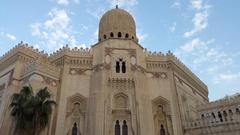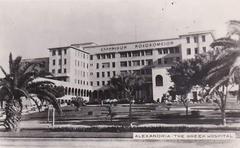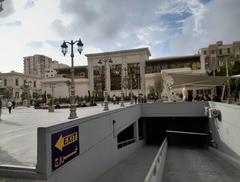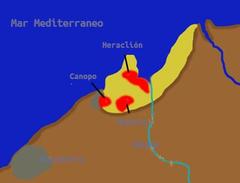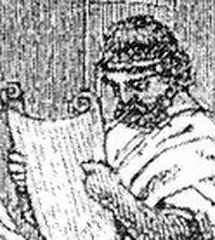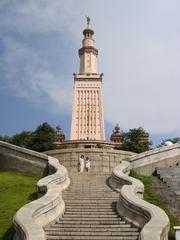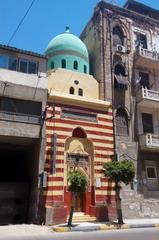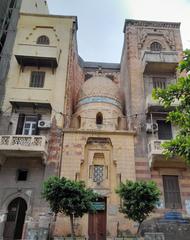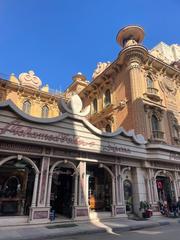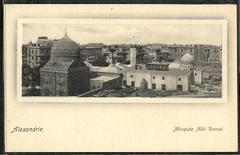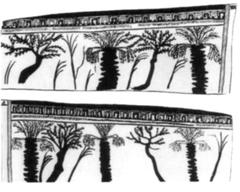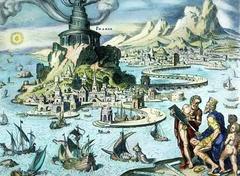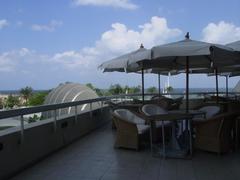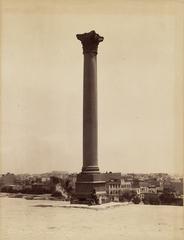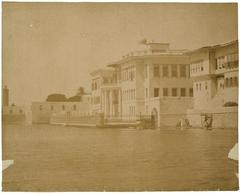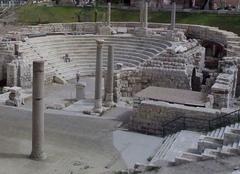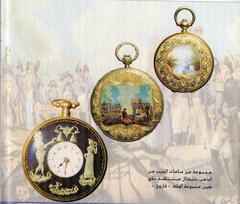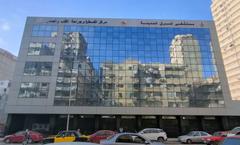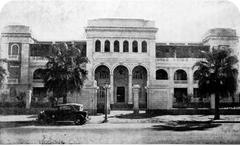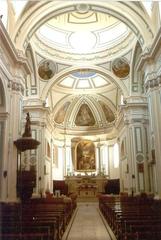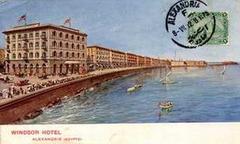Fouad Street Alexandria: Visiting Hours, Tickets, and Historical Sites Guide
Date: 14/06/2025
Introduction: The Living History of Fouad Street
Fouad Street, Alexandria, is not only a central artery of the city but also one of the oldest continuously inhabited planned streets in the world. Established as the Canopic Road by Alexander the Great in 331 BCE, this avenue has been the silent witness to Alexandria’s evolution from an ancient metropolis through Roman, Byzantine, Islamic, and Ottoman periods, and into the modern era. Today, Fouad Street is a vibrant tapestry of neoclassical, art deco, Italianate, and Mediterranean architecture, renowned cafés, and cultural landmarks such as the Alexandria Opera House and the Cavafy Museum. It remains a bustling hub for both locals and visitors—a place where the city’s multicultural heritage and cosmopolitan spirit are on full display. This guide provides essential information for travelers, including visiting hours, ticketing, accessibility, and tips to explore nearby attractions, ensuring a rich and informed experience of Fouad Street’s unique atmosphere. (Round City, Egypt Today, Egypt Independent)
Contents
- Introduction
- Historical Overview
- Ancient Foundations
- Roman, Byzantine, and Islamic Eras
- 19th–20th Century Cosmopolitanism
- Modern Transformations
- Visiting Fouad Street: Practical Information
- Visiting Hours
- Entrance and Tickets
- Accessibility
- Guided Tours
- Nearby Attractions
- Architectural and Cultural Highlights
- Strolling, Dining, and Shopping
- Nightlife and Seasonal Events
- Practical Visitor Tips
- Frequently Asked Questions (FAQ)
- Plan Your Visit
- Sources
Historical Overview
Ancient Foundations
Fouad Street’s origins trace back to the founding of Alexandria in 331 BCE, when Alexander the Great’s planners designed Canopic Road as the city’s main east-west axis. This street was the backbone of the Hippodamian grid plan and linked key sites, including the legendary Library of Alexandria and the royal quarter. Grand colonnades and Greek temples lined its route, testifying to its commercial and ceremonial importance. (Round City, Academia.edu)
Roman, Byzantine, and Islamic Eras
During the Roman and Byzantine periods, Fouad Street retained its central role as the city’s main thoroughfare, adapting to new urban and architectural trends. After the Arab conquest in the 7th century CE, Islamic influences reshaped the cityscape, yet the street’s alignment and importance endured. (Academia.edu)
19th–20th Century Cosmopolitanism
The 19th century ushered in a cosmopolitan golden age for Fouad Street, spurred by Muhammad Ali Pasha’s modernization efforts. The avenue flourished with neoclassical and Belle Époque architecture, and became home to Greeks, Italians, Jews, Armenians, and Levantines. Landmarks such as the Société Immobilière building, Mohamed Ali Club, and the Alexandria Opera House reflect this era’s grandeur and multicultural vibrancy. Literary icons like Constantine Cavafy and E.M. Forster found inspiration here. (Egypt Independent, The Independent)
Modern Transformations
Following the 1952 Egyptian Revolution, Fouad Street underwent significant demographic and architectural changes. Some historic buildings fell into neglect, but others have been revived as cultural centers, galleries, and boutique hotels, sustaining the street’s eclectic character. Preservation initiatives and adaptive reuse continue to balance development with heritage protection. (Egyptian Streets, UNESCO)
Visiting Fouad Street: Practical Information
Visiting Hours
Fouad Street is a public avenue and accessible 24/7. For the fullest experience—shops, cafés, and cultural venues—plan your visit between 9:00 AM and 8:00 PM. Museums and attractions along the street may have specific hours:
- Alexandria Opera House: Tue–Sat, 10:00 AM–6:00 PM (events may vary)
- Roman Theatre and Kom el-Dikka: Daily, 9:00 AM–4:00 PM
- Cavafy Museum: Sat–Wed, 9:00 AM–5:00 PM
Entrance and Tickets
No ticket is required to walk along Fouad Street. Entry fees apply for specific attractions:
- Opera House: Tickets vary by performance
- Roman Theatre: ~60 EGP for adults
- Cavafy Museum: ~50 EGP
Tickets are available onsite or, for major events, via official websites or tourist offices.
Accessibility
Fouad Street is generally pedestrian-friendly with flat, wide sidewalks and tram access. However, some historic sites and cafés may have stairs or limited accessibility. Wheelchair users can navigate much of the street, but should check individual venues in advance.
Guided Tours
Local operators and cultural centers offer guided walking tours focusing on architecture, history, and culinary highlights. Tours often include stops at the Bibliotheca Alexandrina, the Corniche, and the Roman Amphitheatre. Booking in advance is recommended.
Nearby Attractions
- Bibliotheca Alexandrina: Modern library and cultural complex
- Alexandria National Museum: Artifacts from Pharaonic to modern eras
- Roman Amphitheatre (Kom el-Dikka): 4th-century ruins and mosaics
- Corniche: Waterfront promenade with Mediterranean views
Architectural and Cultural Highlights
Fouad Street’s built environment is a showcase of Alexandria’s layered history:
- Société Immobilière Building (1928): Neo-Renaissance façade, now housing “L Passage,” a modern food court (The Independent)
- Mohamed Ali Club: Now the Alexandria Art Centre, a venue for exhibitions and performances
- Historic Cinemas: Including the Isis Cinema (opened 1910), a pioneer in the city’s film scene (Core.ac.uk)
- Alexandria Opera House (Sayed Darwish Theatre): Belle Époque landmark for music and performing arts
- Cecil Hotel: Famed for hosting royalty, politicians, and artists
Architectural styles on Fouad Street include neoclassical, art deco, art nouveau, and Ottoman influences, with ornate facades, curved balconies, and mashrabiya details. These features offer a visual journey through the city’s cosmopolitan heyday.
Strolling, Dining, and Shopping
Classic Cafés and Patisseries
Fouad Street is synonymous with Alexandria’s café culture. Notable venues include:
- Trianon Patisserie: Renowned for French pastries and elegant ambiance—ideal for afternoon tea.
- Délices: Open since 1922, serves European and Egyptian desserts in an art deco setting.
- Pastroudis: Famous for pastries and coffee, a gathering spot for artists and intellectuals.
Culinary Scene
Options range from historic patisseries to modern restaurants:
- Chez Gaby Au Ritrovo: Italian cuisine with wood-fired pizzas
- Santa Lucia: Mediterranean fare with fresh seafood
- Street Food: Vendors offer Egyptian classics like koshari and taameya
Shopping and Markets
Fouad Street is lined with boutiques, bookstores, and antique shops:
- Gold Market: Exquisite local jewelry
- Antique Stores: Unique finds and traditional crafts
- Bookstores: Specializing in Arabic and English literature, often doubling as cultural venues
Nightlife and Seasonal Events
In the evenings, Fouad Street comes alive with bars, music lounges, and shisha cafés. Rooftop venues offer city and sea views, while live music ranges from traditional oud to jazz. During Ramadan and Eid, the street glows with festive lights and special markets, while spring and autumn bring art fairs and festivals celebrating Alexandria’s artistic spirit.
Practical Visitor Tips
- Best Time to Visit: December–February (mild temperatures, low humidity)
- Dress Code: Modest attire, especially near religious sites
- Language: Arabic predominant; English and French widely understood
- Safety: Generally safe, but be cautious with belongings in crowded areas
- Transportation: Accessible by taxi, tram, or on foot; parking is limited during peak hours
Frequently Asked Questions (FAQ)
Q: Is Fouad Street open all day?
A: Yes, it’s a public street accessible 24/7. Shops and cafés typically open 9:00 AM–8:00 PM.
Q: Do I need tickets to visit Fouad Street?
A: No ticket is required for the street itself, but certain venues and museums along it may charge entry.
Q: Are guided tours available?
A: Yes, several local operators offer walking tours; booking in advance is advisable.
Q: Is Fouad Street accessible for wheelchair users?
A: Most of the street is accessible, but some older buildings have limited access.
Q: What are the best times to visit?
A: Late morning to early evening for shops and cafés; December–February for pleasant weather.
Plan Your Visit
Fouad Street is Alexandria’s vibrant heart, offering something for every traveler: historic architecture, café culture, shopping, art, and nightlife. For the best experience:
- Visit during the recommended hours for full access to shops and venues
- Consider a guided tour for deeper insights
- Download the Audiala app for interactive maps, audio guides, and up-to-date event info
- Respect local customs and property
- Check official attraction websites for the latest hours and ticket prices
Visual Guide
- Panoramic view of Fouad Street with Mediterranean backdrop (alt: “Panoramic view of Fouad Street, Alexandria”)
- Interior of Pastroudis café with vintage décor (alt: “Pastroudis café interior with vintage décor”)
- Street food vendors selling koshari and taameya (alt: “Street food vendors selling Egyptian koshari and taameya on Fouad Street”)
- Nighttime rooftop bar scene with city lights (alt: “Rooftop bar on Fouad Street with city and sea views at night”)
Internal and External Links
Summary
Fouad Street is a microcosm of Alexandria’s layered history and cosmopolitan vibrancy. From its ancient foundations as the Canopic Way to its flourishing as a cosmopolitan center and modern cultural hub, the street offers a rich blend of historic sites, celebrated cafés, art galleries, and everyday Alexandrian life. With free public access, a lively atmosphere, and proximity to major attractions, Fouad Street remains an essential and rewarding destination for travelers. For up-to-date information, guided tours, and cultural events, consult official resources and download the Audiala app to enhance your experience (Ahram Online, UNESCO, Wanderlog).
Sources
- Round City: Fouad Street, the Oldest Planned Still Inhabited Street in the World
- Egypt Today: Exploring Fouad Street in Alexandria
- Wanderlog: Fouad Street Alexandria Visitor Experience
- Egypt Independent: Alexandria’s Fouad Street—A Longing for Its Elegant Past
- Ahram Online: Fouad Street, Alexandria’s Historic Heart
- Academia.edu: Migration and Architectural Transformation In Alexandria, Egypt
- Egyptian Streets: From Pharaohs to Pashas—Revisiting Alexandria’s Fouad Street
- Egypt Independent: Fouad Street, Alexandria’s Living History
- UNESCO Tentative List: Alexandria Historical Sites
- The Independent: Alexandria Building Photo Essay, Fouad Street’s History
